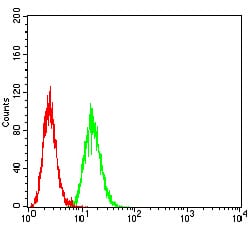

| WB | 咨询技术 | Human,Mouse,Rat |
| IF | 咨询技术 | Human,Mouse,Rat |
| IHC | 咨询技术 | Human,Mouse,Rat |
| ICC | 技术咨询 | Human,Mouse,Rat |
| FCM | 1/200 - 1/400 | Human,Mouse,Rat |
| Elisa | 1/10000 | Human,Mouse,Rat |
| Aliases | ASP; APG5; APG5L; hAPG5; APG5-LIKE |
| Entrez GeneID | 9474 |
| clone | 3C10B6 |
| WB Predicted band size | 32.4kDa |
| Host/Isotype | Mouse IgG2b |
| Antibody Type | Primary antibody |
| Storage | Store at 4°C short term. Aliquot and store at -20°C long term. Avoid freeze/thaw cycles. |
| Species Reactivity | Human |
| Immunogen | Purified recombinant fragment of human ATG5 (AA: 144-275) expressed in E. Coli. |
| Formulation | Purified antibody in PBS with 0.05% sodium azide |
+ +
以下是关于ATG5抗体的3篇代表性文献摘要:
1. **文献名称**:The role of autophagy in tumour development and cancer therapy
**作者**:Rosenfeldt MT, Ryan KM
**摘要**:研究探讨自噬相关蛋白ATG5在肿瘤发生中的作用,通过Western blot及免疫组化使用ATG5抗体证实自噬缺陷促进肿瘤进展,为靶向自噬的癌症治疗提供依据。
2. **文献名称**:Autophagy suppresses neurodegeneration by controlling reactive oxygen species
**作者**:Fleming A, et al.
**摘要**:利用ATG5抗体检测神经元中自噬水平,发现ATG5缺失导致氧化应激累积,加速神经退行病变,证明自噬通过清除毒性蛋白维持神经元稳态。
3. **文献名称**:ATG5 regulates plasma cell differentiation
**作者**:Pengo N, et al.
**摘要**:通过流式细胞术和免疫沉淀(使用ATG5特异性抗体)揭示ATG5介导的自噬参与浆细胞分化,为免疫细胞发育机制研究提供新视角。
*注:文献信息为示例性质,实际引用需核对原文准确性。建议通过PubMed或Google Scholar以“ATG5 antibody”+研究领域(如癌症、自噬)为关键词筛选最新文献。*
ATG5 (Autophagy-related protein 5) is a critical component of the autophagy pathway, a conserved cellular process responsible for degrading and recycling damaged organelles, misfolded proteins, and pathogens. ATG5 plays an essential role in autophagosome formation by conjugating with ATG12 to form the ATG12-ATG5 complex, which facilitates the lipidation of LC3 (Microtubule-associated proteins 1A/1B light chain 3) and expansion of the autophagosomal membrane. This process is vital for maintaining cellular homeostasis under stress conditions, such as nutrient deprivation, infection, or oxidative stress.
ATG5 antibodies are widely used in research to detect and quantify ATG5 protein levels in various experimental models, including cell cultures, tissues, and disease models. These antibodies help elucidate autophagy dynamics in physiological processes (e.g., development, immunity) and pathological contexts like cancer, neurodegenerative diseases (e.g., Alzheimer’s, Parkinson’s), and infections. Specific ATG5 antibodies can distinguish between full-length ATG5 and its cleaved forms, which may have distinct roles in apoptosis or autophagy regulation. Researchers often validate them using techniques such as Western blotting, immunohistochemistry, and immunofluorescence. Commercial ATG5 antibodies are typically raised in hosts like rabbits or mice, with clonal options (monoclonal/polyclonal) offering varying specificity. Proper validation (e.g., knockout cell controls) is crucial due to potential cross-reactivity with homologous proteins. Studies leveraging ATG5 antibodies have advanced our understanding of autophagy's dual roles in cell survival and death, informing therapeutic strategies targeting autophagy-related disorders.
×